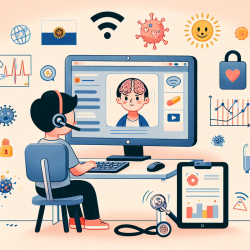Introduction
The COVID-19 pandemic has had a profound impact on mental health services, particularly for children and adolescents with pre-existing conditions like depression and anxiety. A recent study titled "Mental Health Symptoms and Service Use in Depressed and Anxious Minors at the Onset of COVID-19 in a County Clinic Serving a Predominantly Hispanic Population" provides valuable insights into these changes. This blog aims to help practitioners improve their skills by implementing the outcomes of this research or encouraging further exploration in this area.
Research Findings
The study observed a 20.7% increase in mental health service utilization among minors during the early stages of the COVID-19 pandemic. This increase was accompanied by a rapid shift from in-person to virtual care, highlighting the potential of telehealth in maintaining service accessibility during crises. The study also identified key predictors of worsening psychiatric symptoms, including mood issues, suicidal ideation, relationship conflicts, sleep problems, and physical health issues.
Implications for Practitioners
For practitioners providing online therapy services, these findings underscore the importance of being vigilant about the risk factors that can exacerbate mental health conditions in children. Practitioners should consider the following strategies:
- Enhanced Screening: Implement comprehensive screening processes to identify children at risk of worsening symptoms due to mood issues, suicidal ideation, or relationship conflicts.
- Telehealth Optimization: Utilize telehealth platforms effectively to ensure continuous access to therapy, especially for high-risk groups.
- Multisectoral Support: Collaborate with educators and parents to create a supportive environment for children, ensuring they have the necessary resources and support systems.
- Data-Driven Decisions: Use data analytics to monitor therapy outcomes and adjust treatment plans based on individual needs and risk factors.
Encouraging Further Research
While this study provides valuable insights, there is a need for further research to explore the long-term effects of virtual mental health services and identify additional risk factors for worsening symptoms. Practitioners are encouraged to contribute to this body of knowledge by conducting their own studies and sharing findings with the broader community.
Conclusion
The findings from this study highlight the critical role of telehealth in maintaining mental health services during crises like the COVID-19 pandemic. By implementing data-driven strategies and fostering collaboration among stakeholders, practitioners can enhance the quality of care provided to children and adolescents. For more detailed insights, practitioners are encouraged to read the original research paper.
To read the original research paper, please follow this link: Mental Health Symptoms and Service Use in Depressed and Anxious Minors at the Onset of COVID-19 in a County Clinic Serving a Predominantly Hispanic Population.










